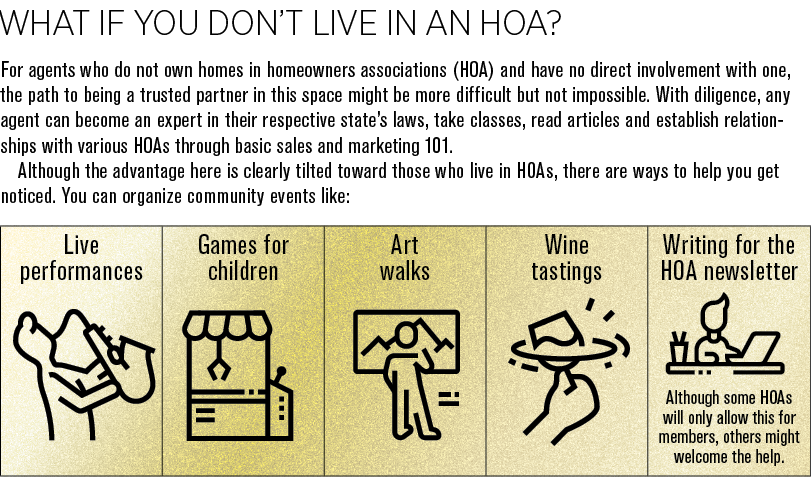Relationships with homeowners associations can result in a treasure trove of leads and sales opportunities
By Jason Henninger
Homeowners associations (HOAs) exist to keep property values high, provide maintenance and, in many cases, manage community facilities such as pools, gyms and more.
Historically, HOAs came from the days when not all cities had trash collection and other now-common municipal services. Groups of homeowners came together to deal with vendors to keep the area in good condition. While some of those services no longer require the bargaining power of an HOA, the associations are far from diminishing. According to the U.S. Census, 82% of homes sold in 2021 were connected to HOAs, and 27% of Americans live in HOA-affiliated homes, a substantial increase over just a decade before.
The advantage of HOAs to the homeowner is clear: In exchange for fees and a slight loss of autonomy (you have to play by the rules), you get to live in a community whose features and value are prioritized.
The advantage for real estate agents to get in with an HOA is even better. “Marketing within an HOA has been a reliable source of business for me since I was a new agent. You have a better chance of getting seller leads, obviously,” says Deb Staley Schopf, CRS, broker associate at RE/MAX Realty Suburban in Lenexa, Kansas. She has 20 years of experience, specializing in maintenance-provided homes, condos, townhomes, patio homes and villas, and is preparing to teach a class on selling in HOAs. “Most of the homes that I sell are part of an HOA because they have some level of maintenance provided,” she says. “I am also fortunate to sell some new construction, and they are always in an HOA in my area.”
Alisha Austin, CRS, broker/owner of Homes in Heels in Round Rock, Texas, is the author of the only Texas Real Estate Commission-approved continuing education HOA classes. Austin serves on the Texas REALTORS® Public Policy Business Issues Committee, which is tasked with proposing new legislation and reviewing current laws. In addition, she served on the 2024 State & Local Issues Committee for NAR. Her 20 years of HOA knowledge coupled with 17 years in real estate have earned her the nickname “The HOA Lady.”
“I moved to Texas in 2003 and walked into my first HOA meeting a month after we bought our house,” Austin says. “And they said, ‘Do you want to be on the board?’ And I’ve been on the board ever since.”
Getting started
The surest road to establishing yourself as an HOA expert, getting leads and becoming known in this market area is to live in a home with an HOA yourself and be involved with the HOA board.
Both Austin and Staley Schopf began creating their HOA presence this way. When Staley Schopf was a brand-new agent 20 years ago, she was on an HOA board. “Even though I was new, people knew me, and they trusted that I was getting extra training,” she says. “We had a newsletter, and I advertised in it. Everything that I did in that HOA led to lifelong friends and business. My real estate partner lives in a large HOA, and we advertise in her newsletter. It absolutely gains us listings.”
Austin tells a similar story. Before moving to Texas in 2003, she had no experience with HOAs, but after joining one, she became involved with an HOA board where she lived. “I had never lived in an HOA. I actually read the HOA information at closing. Nobody does that. I said, ‘Wow, these people seem to have a lot of power. I think I’ll at least go to this meeting and see what it’s about.’ And I’ve been on it ever since.”
There are several advantages of direct involvement. You become known in the community; you’re not just a name on a business card. You gain knowledge of the ins and outs of HOA life. The details of the contracts and board procedures can be overwhelming for new homeowners, but if the agent comes with a practical understanding and direct stake in these rules, the agent can be a greater asset to buyers and sellers alike in navigating the particulars.
Win-win-win situation
When there’s a physical presence in the community and on the board, an agent’s involvement in HOAs can be an all-around win for agents, HOAs and prospective clients. Establishing relationships and having better leads is a big part of the advantage to agents, but it’s in homeowners’ best interest to be very informed, as well. For the HOA, the benefit is having a well-informed and committed board member. For the homeowner, the benefit is someone who can help them through the process, knowing what to look out for.
“I present myself to [clients] as somebody who is very knowledgeable in HOAs in general and knows the questions to ask so that they have all the relevant information,” says Staley Schopf.
Not all HOAs are created equal. Fees and services vary, and so do levels of organizational efficiency. Some may have great contracts with maintenance and repair companies but may be a bit of a mess with paperwork. Others might have procedures buttoned up, but even then, it helps the client to have someone who understands it all, especially as some HOAs may, intentionally or otherwise, have rules enforced that contradict local laws. The average homeowner is not likely to know all the legal details, so this is another area where a well-informed residential real estate professional can be an asset.
It is also common for members of the HOA to have other agendas. For example, if a member is a plumber, they may push for the HOA to contract with them. While this kind of self-promotion isn’t wrong or harmful, it can affect how the board works, positively or negatively. A real estate agent in this situation is also there, in part, to promote their business, but has the additional responsibility to make sure things run smoothly for their own home and their clients.

Check out the latest HOA trends with RRC’s 2024 Webinar Bundle at CRS.com/learn/webinars.
Photo: iStock.com/rasslava








